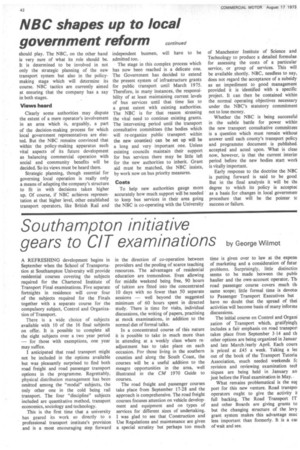Southampton initiative
Page 44

If you've noticed an error in this article please click here to report it so we can fix it.
gears to CIT examinations by George Wilmot
A REFRESHING development begins in September when the School of Transportation at Southampton University will provide residential courses covering the subjects required for the Chartered Institute of Transport Final examinations. Five separate fortnights in residence will cover four of the subjects required for the Finals together with a separate course for the compulsory subject, Control and Organization of Transport.
There is a wide choice of subjects available with 10 of the 16 final subjects on offer. It is possible to complete all the eight subjects over a two year period — for those with exemptions, one year may suffice.
I anticipated that road transport might not be included in the options available but was pleasantly surprised to find both road freight and road passenger transport options in the programme. Regrettably, physical distribution management has been omitted among the "modal" subjects, the only other one in the cold being rail transport. The four "discipline" subjects included are quantitative method, transport economics, sociology and technology.
This is the first time that a university has geared its work so directly to a professional transport institute's provision and is a most encouraging step forward in the direction of co-operation between providers and the pooling of scarce teaching resources. The advantages of residential education are tremendous. Even allowing for middle weekend being free, 90 hours of tuition are fitted into the concentrated 10 days with no fewer than 50 separate sessions — well beyond the suggested minimum of 60 hours spent in directed study. There is time for visits, individual discussions, the writing of papers, practising at mock examinations, in addition to the normal diet of formal talks.
In a concentrated course of this nature it is possible to take in much more than in attending at a weekly class where readjustment has to take place on each occasion. For those living in the southern counties and along the South Coast, the courses will be a useful addition to the meagre opportunities in the area, well illustrated in the CM 1970 Guide to courses.
The road freight and passenger courses take place from September 17-28 and the approach is comprehensive. The road freight courses focuses attention on vehicle development and equipment and on types of services for different sizes of undertaking. I was glad to see that Construction and Use Regulations and maintenance are given a special scrutiny but perhaps too much
time is given over to law at the expens of marketing and a consideration of futur problems. Surprisingly, little distinctiol seems to be made between the pub RI haulier and the own-account operator. Thi road passenger course covers much till same scope; little formal time is devote( to Passenger Transport Executives but have no doubt that the spread of thei activities will become basis of many informa discussions.
The initial course on Control and Organi zation of Transport which, gratifyingly includes a fair emphasis on road transpori takes place from September 3-14 and th other options are being organized in Januar and late March /early April. Each cours is priced at £45 a week. Taking a lee out of the book of the Transport Tutoria Association, much needed weekends fc revision and reviewing examination tea niques are being held in January an just before the Final examination in May.
What remains problematical is the suf port for this new venture. Road transpoi operators ought to give the activity ii full backing. The Road Transport IT and other Boards are giving grants to but the changing structure of the levy grant system makes this advantage muc less important than formerly. It is a ca of wait and see.
































































































